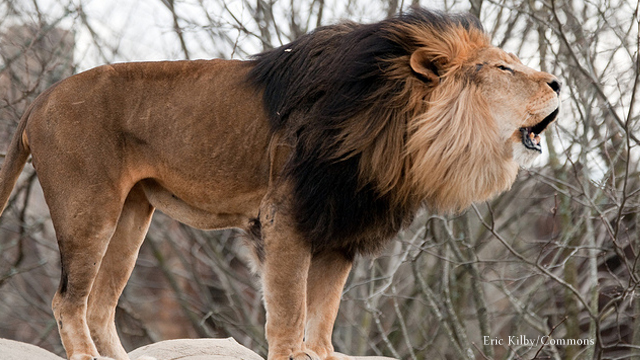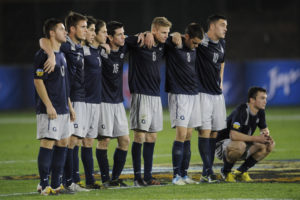O’Sullivan: How to raise a lion chaser

 “Coach, I don’t want to take a penalty shot,” said a very nervous 13-year-old player of mine a few years back. We were in the Oregon Soccer State Cup semifinals, and this talented but not quite confident young girl looked in no mood to take a shot in the penalty shootout to determine whether or not our team advanced to the state finals.
“Coach, I don’t want to take a penalty shot,” said a very nervous 13-year-old player of mine a few years back. We were in the Oregon Soccer State Cup semifinals, and this talented but not quite confident young girl looked in no mood to take a shot in the penalty shootout to determine whether or not our team advanced to the state finals.
“I’ll take it,” said her teammate Rachel, with a look of determination on her face. I smiled. The player who backed out of shooting was a great player, but not always for the big occasion. Her teammate who volunteered was also very good, but I smiled because she had actually MISSED the deciding penalty kick a year earlier at the same stage of the competition. Yet here she was, unfazed. Of course I let her take the kick (and if you want to know what happened, read on).
Why is it that some players see obstacles and problems as opportunities, while others focus on the negative consequences of failure?
What if our greatest opportunities in life lie right beneath our nose, masked as our biggest problems, our worst failures, and our greatest fears?
These are the questions that are asked in Mark Batterson’s fantastic book In a Pit with a Lion on a Snowy Day: How to Survive and Thrive When Opportunity Roars
, which was recommended to me by my friend Joshua Medcalf at Train to be CLUTCH (thanks Joshua, what a book!) The book is written by a Christian pastor, and thus has many references to God and the bible, but regardless if you are a Christian or not, this is well worth the read!
In a Pit with a Lion on a Snowy Day tells the story of the Old Testament hero Benaiah, a famous warrior who gained notoriety by literally chasing a lion into an icy, snow-filled pit and emerging victorious. Batterson uses that story as a metaphor to explain how life often positions us in the right place at the right time, only in Batterson’s words, “the right place seems like the wrong place, and the right time often seems like the wrong time.”
As a coach, we want a team full of lion chasers. We want fearless, confident competitors, risk takers, and athletes who are unfazed by pressure.
As a parent, there is perhaps nothing more frustrating then seeing your child presented with a great opportunity, yet paralyzed by fear and uncertainty. When we look back at our own lives, most of our regrets are often the things we didn’t do (inaction), and not the ones we did (action).
Of course we don’t want our children to make some of the same mistakes we did. Yet far more importantly, we don’t want them to miss the opportunities we missed out on. With the perspective of adulthood, we can see what lies before them, and we have the opportunity to create a world for them where they see opportunity instead of problems, and they take the plunge instead of fearing failure. This is especially true when it comes to sports. We don’t want fearful athletes who lack confidence.
WE WANT LION CHASERS!
Sadly, the path I see many parents heading down is not the path of raising a lion chaser. I see three big ways that well-intentioned parents and coaches destroy an athlete’s ability to become a lion chaser.
 When we see an opportunity and decide to determine our kids’ goals for them, instead of accepting their goals, we prevent them from becoming lion chasers. They will never develop the autonomy and intrinsic motivation to chase something great if they are chasing after the things we want for them, instead of the things they want for themselves.
When we see an opportunity and decide to determine our kids’ goals for them, instead of accepting their goals, we prevent them from becoming lion chasers. They will never develop the autonomy and intrinsic motivation to chase something great if they are chasing after the things we want for them, instead of the things they want for themselves.- When we push our kids toward our goals instead of toward their goals, not only do they push back, but they become acutely aware of the fact that they are letting us down over and over. Instead of becoming the passenger on the quest for whatever dreams our children possess, while providing love and support, we become the driver. Pretty soon we may notice they are no longer in the car.
- Perhaps most damaging, when we protect our kids from failure, when we swoop down and pluck them from every challenge (the helicopter parent) or when we remove all obstacles in their path for them (the lawnmower parent), we prevent them from developing the grit and determination to chase that proverbial lion into the snowy pit.
If we want our athletes to make the most of every opportunity, then we can help them see the opportunities, but they must plunge head-first into the challenges through their own volition, and not ours. Our athletes must be the ones who choose to face their fears, and thus achieve success in Batterson’s words by doing “the best with what you have where you are.”
So how can we do this?
Here are five ways you can raise a lion chaser of your own:
- Lion chasers realize that impossible odds can become improbable victories. While many athletes fear failure, and thus flee from any task or dream that seems too big, a lion chaser will embrace the challenge. She knows that there are few consequences for failure, since, well, you were supposed to fail. But if you win, well then you have really achieved something. Teach your athletes that the bigger the chances of failure, the greater and more fulfilling the achievement is when successful.
- Lion chasers cure the fear of failure through failure. The cure for the fear of failure is not success; it’s failure. You must be exposed to small quantities of whatever it is you are afraid of in order to build up immunity to it. Often times, the thought of failure is far more powerful than the actual event. Give your athlete an environment of love and respect, so they know that your love for them does not depend upon the result or performance. Then, if your child is a dominant player in his age group, then give him the opportunity to play up an age or two, so he does not experience only success. If he is always on a winning team, then find him a weaker one to guest play for, and experience disappointment. If he is dominant at one sport, try another sport where he may have to be a role player for a while. These opportunities to fail and learn from it are invaluable! As Batterson says, “lion chasers choose fear.” I would add that they also choose uncertainty.
- Lion chasers redefine success and failure. When we look back upon our lives, we are not only grateful for the good things, but for the bad things that taught us, toughened us and prepared us for the good things to come. Instead of being the parent who is always there to “get your child out of” difficult circumstances, instead become the person who advises your child to “see what you can GET OUT of this situation.” We can help our athletes change their perspective from “winning and losing” to “winning and learning.” We can help our kids play to a higher purpose than winning. The importance of their journey is no longer reaching a destination, but what they become on the path. And on that path, lion chasers never let what they can’t do prevent them from doing what they can do.
- Lion chasers focus on effort and not ability. It is important that as parents and coaches, we do the same. Praise our children for the effort, which they control each and every day. They do not control wins and losses in most sporting events, as opponents, referees, weather conditions and the like all have an effect upon the outcome. But a lion chaser controls her effort and focus each and every day. She knows that everybody wants to win on game day, but true champions are the athletes who want to win six weeks out, six months out, and six years out. She prepares with great effort and focus, and her coaches and parents praise her for that which she controls. As George Bernard Shaw says, “People are always blaming their circumstances for what they are. I don’t believe in circumstances. The people who get on in this world are the people who get up and look for the circumstances they want, and if they can’t find them, they make them.”
- Lion chasers know that playing it safe is risky. Small changes, small choices and small investments can pay off handsomely and have major consequences. So many athletes never go after a lofty goal because it is so far off that they forget to invest in the commitments it takes to get there. Other athletes are afraid to have a big dream, and to give their very best, for it can be quite humbling to give your all and fail. It is easier to say “I really didn’t care about today” then it is to say “I gave everything and I am not there yet.” But the lion chaser always cares. He adds an extra hour or two a week of practice. He works on eating and sleeping better. These are small things, one percent improvements over time that add up and make a huge difference. It all starts with taking the first risk to dream big, and making the initial commitments to follow that dream. It all starts with NOT HAVING regrets over inaction!
 So what happened to Rachel, the 13-year-old girl I mentioned above, the one who volunteered to take the deciding penalty kick in a state semifinal?
So what happened to Rachel, the 13-year-old girl I mentioned above, the one who volunteered to take the deciding penalty kick in a state semifinal?
She missed. Again. Just like she had the year before. And just like the year before, the team was eliminated and heartbroken, as was Rachel. But she was different than most. She didn’t want to quit. She became more determined to get better.
A few years later I had the opportunity to coach Rachel again, only now she was an elite 16-year-old goalkeeper. We were playing in a high-level college showcase event against some of the top teams in the US, and you guessed it, we were in a penalty kick shootout. Yet here is the catch. Rachel, and some other team members, had gotten food poisoning a few hours earlier. Rachel was terribly sick, and I told her she did not have to participate in the shootout as she could not stop vomiting.
Her response: ‘Coach, I am playing.”
With that, she picked up the garbage can that was at midfield and carried it over to the goal we were shooting on. She proceeded to save three out of five penalties our opponent shot. In between each and every one, she walked over to the garbage can and vomited. Can you imagine the look on our opponents’ faces?
I cannot think of a prouder moment in all the years I have coached.
Today Rachel is playing college soccer at one of the top programs in the country. I know she will be successful, not because of some special athletic gift she has, or any great coaching she got from me. That is the bare minimum that it takes to succeed at a high level.
Rachel will be a huge success in sport and life because she sees opportunity instead of risk. She takes failure and success in stride. She marches to her own beat instead of trying to please everyone else. And whenever others take a step back because they see problems, failure and fear, she steps forward and says “I’ll take it.”
Rachel is a LION CHASER!
Will your kids be next?
—
SOCCERWIRE MARKETPLACE
- Wanted Licensed Youth Soccer Coach
- Join Official Elite Summer Soccer Camps with Europe’s Top Pro Clubs!
- The St. James FC Travel Staff Coach - North (Loudoun) & South (Fairfax)
- The St. James FC Girls Academy (GA) Head Coach - 2 teams
- The St James FC Boys Travel Tryouts
- OFFICIAL BAYERN MUNICH SUMMER CAMPS U.S.
- JOIN THE ALLIANCE!
- OFFICIAL FC BARCELONA CAMPS U.S.
- The Cup San Diego - Hosted by Legends FC
- Players Wanted - Undergraduate or Post-graduate












